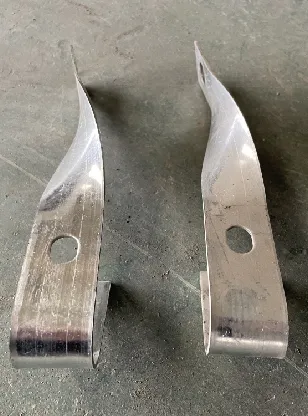loading...
- No. 9, Xingyuan South Street, Dongwaihuan Road, Zaoqiang County, Hengshui, Hebei, China
- admin@zjcomposites.com
- +86 15097380338
- Welcome to visit our website!
industrial water treatment equipment
Industrial Water Treatment Equipment An Essential Component for Sustainable Operations
In today's industrial landscape, the need for efficient water treatment solutions has never been more critical. As industries face increasing regulatory scrutiny and environmental pressures, the demand for advanced industrial water treatment equipment continues to rise. This equipment not only ensures compliance with local and international water quality standards but also promotes sustainability and resource conservation, making it a vital investment for any industrial facility.
Understanding Industrial Water Treatment
Industrial water treatment involves various processes designed to improve water quality for specific applications, whether it be cooling systems, boiler feed, or manufacturing processes. The objective is to remove contaminants, such as sediment, organic materials, and chemicals, to ensure that water is safe for use and complies with environmental regulations. Additionally, treated water can often be reused within the facility, thereby minimizing the consumption of fresh water and reducing operational costs.
Types of Water Treatment Equipment
1. Filtration Systems Filtration is a fundamental process in water treatment. Various types of filters, including sand, carbon, and multimedia filters, are used to remove suspended solids and larger particulate matter from water. Advanced filtration technologies, such as microfiltration and ultrafiltration, can effectively eliminate smaller particles and pathogens, ensuring a higher quality of treated water.
2. Reverse Osmosis Systems Reverse osmosis (RO) is a widely adopted membrane technology that separates ions, molecules, and larger particles from water. This equipment is particularly effective for desalination and deionization, making it invaluable for industries that require high-purity water, such as pharmaceuticals and electronics manufacturing.
3. Chemical Treatment Systems In many industrial processes, chemical treatment is employed to neutralize contaminants and prevent scaling and corrosion. Various chemical dosing systems are used to introduce coagulants, disinfectants, or pH adjusters into the water. These systems require precise monitoring and control to ensure optimal performance and safety.
4. Ultraviolet (UV) Disinfection UV disinfection is an environmentally friendly method to eliminate pathogens in water without the use of harmful chemicals. UV systems use light at specific wavelengths to disrupt the DNA of microorganisms, rendering them inactive and safe for discharge or reuse.
5. Wastewater Treatment Systems Many industrial facilities generate wastewater that must be treated before being discharged into the environment. Wastewater treatment equipment can include biological treatment, anaerobic digesters, and advanced oxidation processes. These systems are designed to break down organic materials and remove nutrients and contaminants, enabling safe and compliant discharge.
industrial water treatment equipment

Benefits of Implementing Water Treatment Equipment
The incorporation of effective water treatment equipment provides numerous benefits for industrial facilities
- Regulatory Compliance Industries must adhere to stringent regulations regarding water quality and discharge. Advanced water treatment solutions ensure compliance with local, national, and international standards, minimizing the risk of legal penalties and operational shutdowns.
- Cost Savings By treating and reusing water, industries can significantly reduce their reliance on fresh water sources. This not only cuts costs associated with water procurement but also lowers wastewater disposal fees.
- Environmental Responsibility A commitment to sustainability is increasingly important for businesses. By investing in state-of-the-art water treatment equipment, companies can reduce their environmental footprint and contribute positively to their communities.
- Operational Efficiency Clean, treated water improves the efficiency of industrial processes. For example, using high-quality water in cooling systems can prevent scaling and corrosion, thereby extending the lifespan of equipment and reducing maintenance costs.
Conclusion
Industrial water treatment equipment plays a pivotal role in the sustainable operations of modern industries. By investing in advanced treatment solutions, companies not only protect their processes and assets but also contribute to a more sustainable future. As regulatory demands increase and environmental awareness grows, the importance of effective water treatment cannot be overstated.
In a world where water scarcity is becoming a pressing issue, the ability to treat and reuse water efficiently is not just beneficial; it is essential for the longevity and viability of industrial operations. The future of industrial sustainability depends on our ability to innovate and improve our water treatment practices today.
-
GRP Structures: The Future of Lightweight, High-Performance EngineeringNewsJun.20,2025
-
FRP Water Tank: High-Performance Storage for Corrosive and Clean Water SystemsNewsJun.20,2025
-
FRP Square Tube: The New Industry Standard for Chemical and Structural ApplicationsNewsJun.20,2025
-
FRP Pultruded Profiles: The Ultimate Choice for Lightweight Structural StrengthNewsJun.20,2025
-
FRP Handrails: The Safer, Smarter, and Stronger Choice for Modern InfrastructureNewsJun.20,2025
-
FRP Grating: The Smart Solution for Durable, Lightweight Industrial FlooringNewsJun.20,2025
-
Why Choose a Galvanized Water Tank for Your Storage NeedsNewsMay.21,2025
